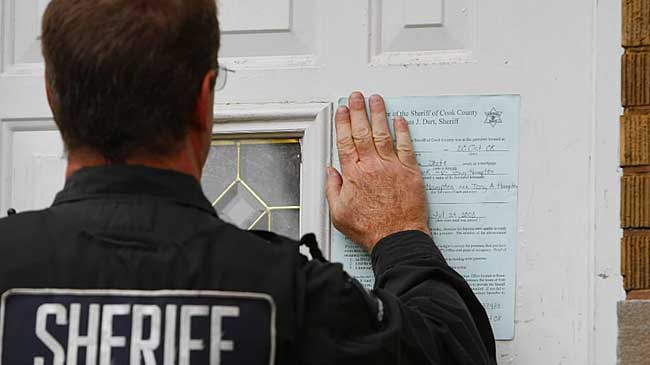The New Jersey Foreclosure Sale Overhaul That Went Into Effect In January Has Homeowners in Foreclosure Confused
 A new law that has upended the New Jersey foreclosure sale process for residential properties has homeowners scratching their heads. New Jersey Governor Phil Murphy signed the bill into law on January 12, 2024. The new law took effect immediately.
A new law that has upended the New Jersey foreclosure sale process for residential properties has homeowners scratching their heads. New Jersey Governor Phil Murphy signed the bill into law on January 12, 2024. The new law took effect immediately.
The new law establishes a Community Wealth Preservation Program. The program expands access for certain buyers to purchase residential properties at sheriffs’ sales. It also created certain rights of refusal in connection with sheriffs’ sales. In addition it also amended sheriffs’ fees that are due for conducting such sales.
Generally, the new law applies to residential properties.
Notice of Foreclosure Sale Under The New New Jersey Foreclosure Sale Process
There are now new requirements with providing notice of the foreclosure sale. The law now requires the sheriff send a notice to the property address and the primary address of the homeowner defendant. The language on the envelope must plainly state that the envelope is a notice for the sale of foreclosed property. In addition, it must contain language that the notice complies with the Fair Debt Collection Practices Act.
Notice of Price and Occupancy Disclosure
 The lender must provide an estimate of the upset price at least four weeks prior to the sale. The sheriff’s department must also post the notice on the sheriff’s website. Except in certain cases, the price cannot be increased by more than 3% from the price provided in the notice.
The lender must provide an estimate of the upset price at least four weeks prior to the sale. The sheriff’s department must also post the notice on the sheriff’s website. Except in certain cases, the price cannot be increased by more than 3% from the price provided in the notice.
The law bars lenders from contacting borrowers or their relatives to determine if they are participating at the sale. The new law also bars lenders from delaying the sale if the borrower or their relatives intend to participate.
Prior to the sale, the plaintiff is required to disclose whether the property is vacant, tenant-occupied or owner-occupied. The plaintiff also has to disclose if they have access to vacant property. If they do, the plaintiff must provide access to the successful bidder.
3.5% Deposit/90 Business Days to Close for Certain Buyers
The new law contains exceptions to the requirement that successful bidders pay a 20% at the sale. Certain types of successful bidders are now permitted to pay 3.5%. Bidders include the homeowner defendant, next of kin, tenants, NCDCs. Successful bidders must occupy the property as a primary residence for at least 84 months.
The balance on the auction bid is due within 90 business days. Successful bidder also are not faced accruing interest against them until 60 business days after the sale.
Mortgages Permitted to Purchase Certain Foreclosed Properties
The new law includes conditions that allows certain buyers to take out a mortgage to purchase the foreclosed property. Moreover, if those buyers failing to close within 90 business days through no fault of their own, they shall be refunded the deposit. The new law also creates certain rights of first and second refusal. However, if those buyers fail to close within 90 business days of the initial sheriff’s sale, no such rights survive.
The Borrower, Next of Kin and Tenant’s Right of First Refusal to Purchase
If the foreclosed homeowner, his or her next of kin, or a tenant has secured financing to purchase the property, that individual has a right of first refusal to purchase the property for the amount of the original price.
Additionally, that individual retains the right of first refusal for a rescheduled sale dates. The homeowner executes the right of first refusal by paying the 3.5% deposit prior to the opening of bidding. They will have to pay the remaining balance within 90 business days.
The benefits conferred on the bidder are subject to the foreclosed homeowner going into foreclosure due to circumstances outside of their control.
Mortgage Pre-Approval Required
The new law expressly allows certain types of buyers to purchase by way of financing. That is, assuming they have been pre-approved. by certain regulated financial institutions for at least the amount of the original listed price.
Restrictions and Penalties Applicable to Tenants and Other Bidders
The successful bidder who pays the 3.5% deposit and finances the purchase must have received HUD homebuyer counseling. They must also provide the sheriff proof of completion or enrollment in that program.
Tenants must provide proof that they have resided at the property for at least a year. They must also prove they are not in arrears on rent. Tenants are allowed to purchase under the provisions of the new law if the foreclosed homeowner or next of kin decides not to participate in the sheriff’s sale.
The properties sold to those bidders other than the homeowner or next of kin who must occupy the property as their primary residence for 84 months.
The deed must clearly state that the property may not be sold for 84 months from the date of the sheriff’s sale.
A bidder who finances the purchase and does not occupy the property for 84 months faces a fine of $100,000 fine. He or she faces a $500,000 fine for any subsequent violations.
The new law includes provisions for overseeing compliance with the 84-month occupancy requirement.
The NCDC’s Right of Second Refusal
Under certain circumstances, the foreclosed homeowner may request that a NCDC purchase the property. If the NCDC has a written agreement for the purchase, it must allow that party to reside in the property until an affordable lease to be negotiated. The lease must also include an option to purchase the property from the NCDC.
The NCDC also shall have a right of second refusal to purchase the property if they have an agreement in place.
The foreclosed homeowner, next of kin, or tenant has the option of not participating in the sheriff’s sale. They also are not required to enter into an agreement with the NCDC. If they choose not to participate, then
- A NCDC shall have the right of second refusal to purchase the property.
- A NCDC may bid at the sheriff’s sale. The NCDC can exercise it’s second refusal by registering its participation in the sale and paying a 3.5% deposit prior to the opening bid.
Restrictions and Penalties Applicable to NCDCs
NCDCs are subject to fines if they do not comply with certain additional restrictions. An NCDC that is the successful bidder of vacant or abandoned property must restore it “as need be.”
They need to sell it to a household earning no more than 120% below area median income. They can also rent to it to a household earning no more than 100% below area median income.
NCDCs must also ensure that these restrictions remain in place as to prevent future owners in any future sale of the property.
Sheriffs’ Fees
The law previously entitled Sheriffs to commissions based on the successful bid price of the foreclosure sales. Those commissions were 6% on all sums not exceeding $5,000 and 4% on all sums exceeding that amount. The new law entitles sheriffs to a 6% on the entire successful bid price.
Additionally, the new law sheriffs are allowed to collect 10% commission on execution sales. They are entitled to 5% for all sums exceeding $5,000. However, for any sale that reverts to the foreclosing plaintiff, the sheriff is only entitled to $150.00.



